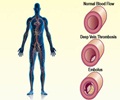Inflammatory bowel disease (IBD) patients undergoing surgery have higher risk of developing deep vein thrombosis (DVT), finds study.

Andrea Merrill, M.D., from Massachusetts General Hospital, Boston, and Frederick Millham, M.D., from Newton-Wellesley Hospital, Boston, analyzed 2008 data from the 211 hospitals participating in the American College of Surgeons National Surgical Quality Improvement Program (NSQIP). Of the 268,703 patients, 2,249 patients had IBD (0.8 percent) and they were compared with 269,119 patients without IBD.
Among all the patients, there were 2,665 cases of DVT or PE (1.0 percent). "Occurrence of DVT or PE was more common in patients with IBD (2.5 percent) overall. Nonintestinal surgical cases had a higher rate of DVT or PE (5.0 percent)," the authors report. "Inflammatory bowel disease had no effect on risk of postoperative myocardial infarction (heart attack) or stroke."
"In conclusion, this study of patients enrolled in the NSQIP database demonstrates that patients with IBD who undergo surgery have a two-fold increased risk of DVT or PE. In patients with IBD who are having nonintestinal surgery, this risk may be even higher. These findings suggest that standard DVT and PE prophylaxis [prevention] should be reconsidered for this patient group."
Source-Eurekalert















